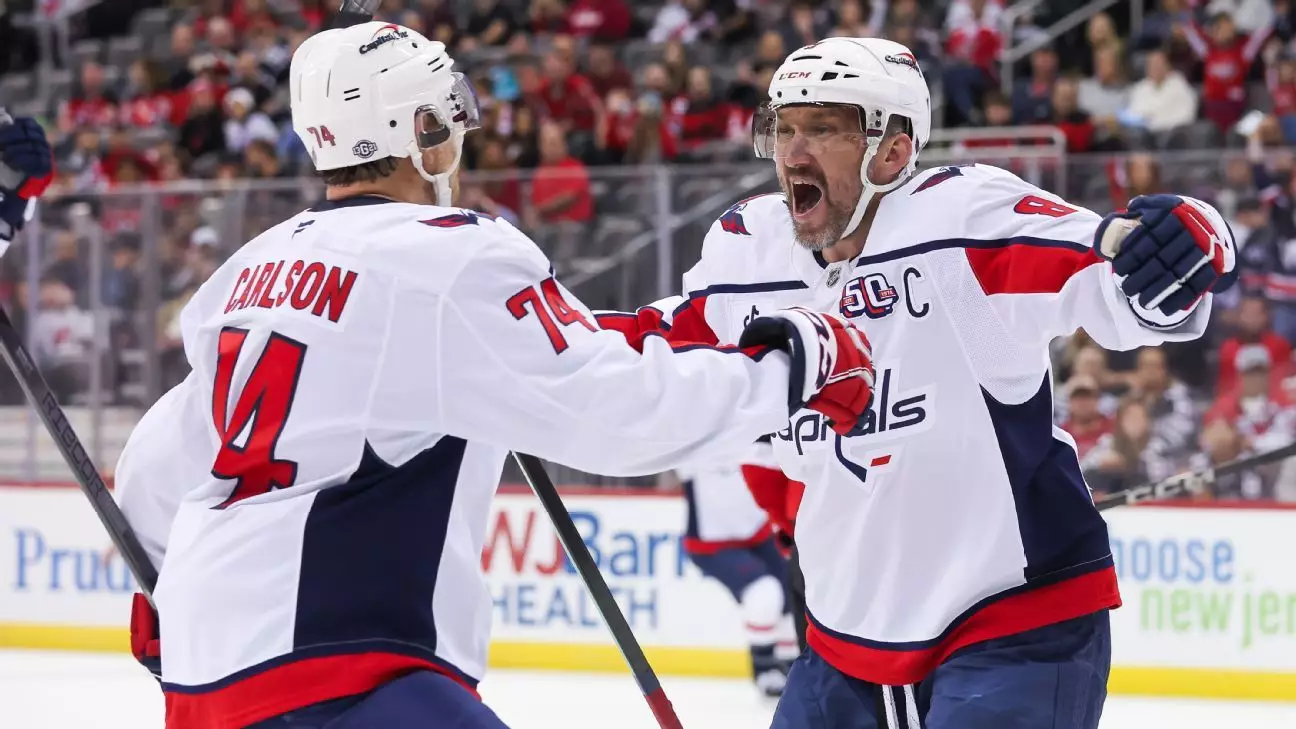The Impact of Alex Ovechkin’s Injury on the Capitals’ Season
For fans of the Washington Capitals, the news of Alex Ovechkin’s injury is like a cold gust of wind in the middle of a promising spring. The 2023-2024 NHL season was shaping up to be an exciting one with Ovechkin leading the charge, but now the team finds itself at a critical juncture. With Ovechkin sidelined for four to six weeks due to a fractured fibula, both his personal quest to break Wayne Gretzky’s all-time goal record and the Capitals’ playoff aspirations hang in the balance.
Watching Ovechkin play has always been an exhilarating experience. This season, he was inching closer to Gretzky’s record with 868 goals under his belt—just 26 shy of the magic number. His scoring prowess brought hope not only to himself but to fans who eagerly anticipated each game. Unfortunately, this injury puts a damper on those dreams, at least temporarily. As if navigating a competitive Metropolitan Division wasn’t challenging enough, the Capitals are now tasked with maintaining their momentum without their star player.
The impact of such an injury goes beyond physical limitations. A fractured fibula is no small setback; it requires not only physical rehabilitation but also mental resilience to come back stronger. For Ovechkin, who has shown remarkable durability throughout his two-decade-long career, this is a rare and unwelcome hurdle. His teammates, including Tom Wilson, have expressed their disbelief at the news, highlighting how integral Ovechkin is not just as a player but also as a leader and motivator.
Key Takeaways
- Ovechkin’s injury could significantly delay his pursuit of Wayne Gretzky’s all-time goal record.
- The Capitals must adapt quickly to maintain their position in the competitive Metropolitan Division.
- Younger players will need to step up and fill the void left by Ovechkin’s absence.
Ovechkin’s Scoring Prowess and Its Impact
At the start of the season, projections showed Ovechkin on track to reach new personal bests with a potential 68 goals for the year. His scoring pace was astonishing, and there was every reason to believe he could surpass his previous records. Now, with him out of action, the Capitals face uncertainty. They currently sit just one point behind division leaders Carolina Hurricanes, making every game crucial in their journey toward securing a playoff spot.
The physical challenge of recovering from a fibula fracture cannot be understated. Injuries like these are notoriously complex and demand rigorous rehabilitation. Players have to trust their bodies again in a sport that demands aggression and precision. For someone like Ovechkin who’s been exceptionally durable over his career, this recovery process will be particularly poignant both physically and emotionally.
Reconfiguring Team Strategy
With Ovechkin out of commission, Coach Spencer Carbery faces the daunting task of reshuffling his offensive lineup. The team previously led the league in scoring with an average of 4.33 goals per game—a figure that’s difficult to sustain without their premier scorer. Players like Connor McMichael and Pierre-Luc Dubois will likely take on more responsibility as they step into new roles within the team’s strategy.
The pressure is on young talents like McMichael and Aliaksei Protas to rise to the occasion. Both have demonstrated potential with their goal tallies this season, but whether they can fill Ovechkin’s shoes remains uncertain. Meanwhile, Dubois needs to rediscover his scoring touch—he’s accumulated 12 points so far but has only netted one goal this campaign.
Team Morale and Leadership
Apart from tactical adjustments, there’s also the challenge of maintaining team morale. The Capitals have rallied around Ovechkin’s pursuit of Gretzky’s record, which has been a source of inspiration for them all season long. Losing him even temporarily is more than just losing goals; it’s losing a symbol of ambition that has united them as a team.
Veteran players must now step up as motivators and guides during this tumultuous period. John Carlson and others recognize that while individual performances are essential, it’s the collective spirit that drives success. They need to ensure that without Ovechkin’s presence on the ice, they don’t lose sight of their ultimate goal—securing that playoff spot.
Final Thoughts
The coming weeks will be defining for both Alex Ovechkin and the Washington Capitals as they navigate this challenging time without their captain. His return will be pivotal not just for his personal legacy but also for bolstering the team’s chances in this competitive season. Whether they rally together in adversity or struggle without their leader will shape the trajectory of their season and potentially redefine their future strategies.
Alex Ovechkin
Washington Capitals
NHL season
sports injury
team strategy


Leave a Reply